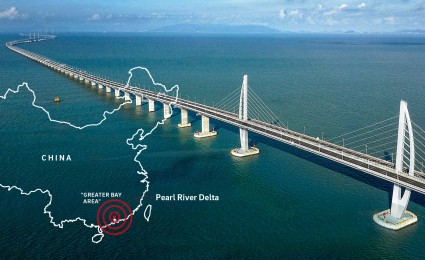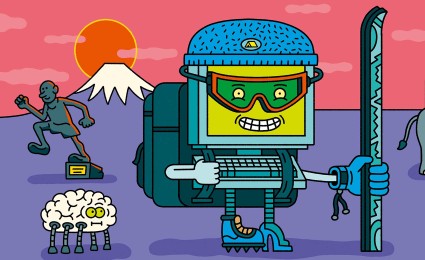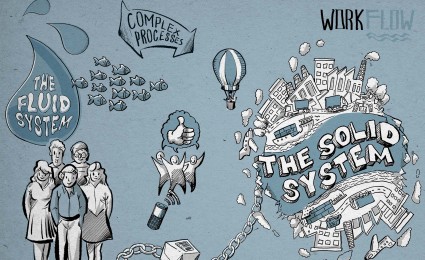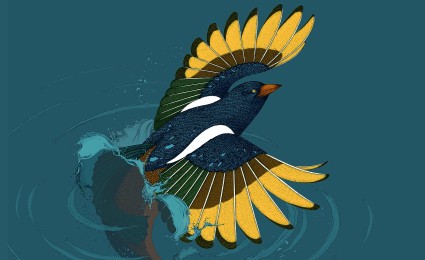Interested in our latest studies and article? Visit our global topic on AI!


Think:Act Magazine "Digital Darwinism"
Brian Solis on experience innovation and survival

Think:Act Magazine
Artificial intelligence is driving a new wave of digital transformation with connected consumerism
According to one of the first people to use the term, digital Darwinism is eradicating brands that do not innovate or adapt to the new and pervasive wave of connected consumerism.
During the rise of smartphones, social media, pervasive internet and real-time apps and services, digital Darwinism has become the new reality. As disruptive technology evolves and accelerates, so do its effects on markets and society. Some adapt, while others do not. All the while however, behaviors, norms and values, tastes and trends, expectations and preferences continue to progress. Our place in the future is decided by how we choose to respond today … right now. Business as usual isn't going to change your course in a positive direction.
Take a moment to remember some of your favorite brands that are no longer with us. So sad, I know – and the names are all too familiar. But their time has come and gone. It's hard to shed a tear when, in many ways, the very reason they're gone is because they chose not to stay with us. They were victims of irrelevance; their investments weren't in alignment with market and societal evolution, nor where they were headed and why. They assumed that if they continued to focus on profits, scale and shareholder/stakeholder value, that they would be around forever. But they, like so many, missed the humanity of it all.

Organizations all around the world are investing in digital transformation to combat digital Darwinism. What started as a migration to more agile technologies and infrastructures is now a global movement aimed at total modernization. One challenge businesses face – beyond the array of technology investments they need to make to compete – is understanding why. Too often, digital transformation overly emphasizes the digital aspect of change. If it were that easy, every organization would invest in leading technologies. Why companies are implementing certain technologies is what's most interesting and promising, because technology and humanity are entwined.
The concept of digital Darwinism isn't new – it's the latest chapter in a saga of economic conditions that includes "creative destruction." Coined in the 1940s by Joseph Schumpeter, the term describes the "process of industrial mutation that incessantly revolutionizes the economic structure from within, incessantly destroying the old one, incessantly creating a new one." The theory of creative destruction also implies that social contracts must be destroyed to free up resources and energy for innovation.
They key word here is "social contract." According to the Oxford English Dictionary, social contracts are an "implicit agreement among the members of a society to cooperate for social benefits." And that's what digital Darwinism is all about – how technology is affecting people and in turn, how they are affecting one another, markets and the insights and possibilities they reveal along the way.
"The greatest challenge to excelling in these times is often ourselves."
It isn't new to say businesses need to innovate or die. The difference though is in how leaders and teams iteratively and ultimately respond. Most absolutely say: "Yes! We need to innovate!" But the difference between success, failure and mediocrity is tied to leadership, empowerment and incentivization. Essentially, business as usual, with a dash of digital transformation, isn't going to change things much. Closing the gap between technology and humanity to understand the human side of change is vital. Understanding digital transformation in this framework helps to realize that it can create new value and experiences for customers, employees and stakeholders.
One realizable solution that builds a bridge between technology and humanity as a source of creativity and innovation and enables surviving – and thriving in –digital Darwinism is "experience innovation." Focusing on understanding customer behaviors, expectations and aspirations, experience innovators fast-track business growth with digital-first customer satisfaction and loyalty. The same disruptive technologies driving digital Darwinism have also had a positive impact on how brands can compete. This is modern customer centricity that leads to unforeseen opportunities for innovation, not just adapting with the times.
A modern digital customer journey means brands have access to a massive amount of real-time customer data – and the innovative ones are investing heavily in collecting, interpreting and understanding it in order to invest in experience innovation and become highly relevant for always-on customers. Empowered with real-time customer insights, they embrace disruptive technologies, from best-in-class mobile platforms to AI and machine learning, to completely innovate the dated and fragmented customer journeys of yesterday, make brands more available, deliver more personalized customer experiences and drive customer loyalty and business growth.
Brian Solis is a digital analyst and futurist at Altimeter, a Prophet company. He helped popularize the term "Digital Darwinism," is a keynote speaker and the author of eight bestselling books, including Lifescale and Engage.
Innovative brands are transforming conventional organizational models around disruptive customer data and experience. In the process they are evolving the role of marketing within the organization to help compete in an era of digital Darwinism. This sets the stage for next-level, experience-led innovation where the value proposition, the brand and the customer's experience are one by design and by execution. Experience innovators are driving growth through extraordinary, digital-first customer experiences and embracing the disruptive technologies. They're organizing around real-time data and focusing on customer experience as a catalyst for driving business performance and true customer centricity.
More specifically, experience innovators collect and interpret real-time data to better understand their customers – and they also deploy new technologies like AI and machine learning to quickly analyze and respond to it instantly and automatically. They focus on discoverability. Getting to customers first matters more than ever. Engage with customers in more personalized ways. By delivering relevance and usefulness to customers in important "moments of truth," brands become a valuable companion. What's more, they bring previously disparate and siloed functions together in an effort to deliver a cohesive and seamless customer journey. They become "tech companies" in their own way, embracing innovation to deliver faster, intuitive, and best-in-class customer experiences.
Ignorance is bliss – until it's not. And the greatest challenge to excelling in these times is often ourselves. We need to see things differently to react differently. It's more than a matter of "adapt or die!" We should do more than just survive. We should innovate because we're inspired by a greater cause. When we place people at the center of our work, we give our ideas and strategies purpose, and that places us on a path of relevance over obsolescence. So here's the mantra: innovate or die!
How evolution drives success in the digital era
![{[downloads[language].preview]}](https://www.rolandberger.com/publications/publication_image/Think_Act_Magazine_Darwinism_Cover_EN_download_preview.jpg)
Change. Survive. Thrive. What your company needs to know to prosper in the digital age.
Curious about the contents of our newest Think:Act magazine? Receive your very own copy by signing up now! Subscribe here to receive our Think:Act magazine and the latest news from Roland Berger.


















